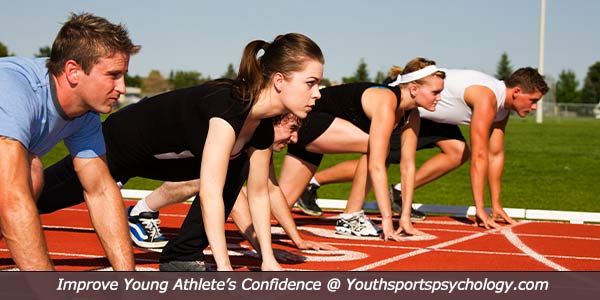How to Help Young Athletes Stay in the Present
Mistakes and losses are part of the game in sports. But often, kids fear them.
There are two types of athletes in sports: The first focuses on the fear of making mistakes while the second athlete focuses on making plays.
When kids focus on their fears, they concentrate too much on negative outcomes and unknowns.
Focusing on fear can stop kids in their tracks and disrupt their improvement. It will inhibit peak performance.
Imagine what would happen if a hockey goalie focused solely on staring at his stick instead of the play in front of him. Or if a golfer looked at another golfer while attempting to drive a ball off the tee. Both choices would end in disaster.
When athletes obsess over losing, they are no longer focused on successfully performing in the moment. They are more worried about losing and the meaning they assign to losing.
For example, kids might tell themselves, “If I lose, it will mean that I am not talented.”
Imagine the following scenario: A volleyball player is serving to close out a set…
The athlete’s team is favored to win the match, but the opposing team is on top of their game, saving the ball with athletic digs and blocking shots. The match is closer than anyone expected.
Instead of focusing on the positioning of the opposing team, the player serving may focus on trying to avoid serving the ball into the net. The player’s fear causes the player to be nervous, slightly throwing off her timing. The player serves the ball right into the net, just like she feared.
To perform at their peak, kids’ focus should be oriented on the present. “What should I do now?” instead of focusing on what ifs and negative outcomes.
Jean FranÁois Menard, a mental performance coach, has been working with Laurence Vincent-Lapointe, a 13-time world champion canoeist, as she prepares to hopefully compete in the 2021 Tokyo Olympics.
“When you show up at the Olympics, every athlete is strong physically, every athlete is prepared technically, but the ones who typically perform very well are the ones who can manage the moment, manage themselves, manage the pressure, manage the expectations that come with that,” said Menard.
Vincent-Lapointe has faced a lot of adversity, including testing positive for a questionable performance-enhancing substance. Vincent-Lapointe has faced many fears regarding her ability to regain her form and compete at a high level again.
“[Menard] helped me realize that whenever I’m afraid of something that’s going to happen, it’s all speculative. I’m not basing my fear on something real, I’m basing my fear on something that hasn’t happened,” said Vincent-Lapointe. “So he helped me get back in the moment and get back to what I know I’ve done, my successes, and every good thing I’ve done.”
Kids don’t have to fuel their fears. They can focus on their actions in the moment. The fears may be in the back of their mind, but their fears won’t be as intrusive.
Once kids regain their focus in the present, they free themselves to put all their effort into performing in the moment.
In addition, healthy internal dialogue can help kids overcome irrational fears. Young athletes should ask themselves the following questions: “What do I fear? Is this outcome a definite? If no, what can I do in the present to enhance my performance the most?”
Fear is often irrational. When athletes counter fear with logical thinking, they are better able to immerse themselves in the moment and perform at their peak.
Related Articles on Youth Sports:
- Helping Sports Kids with “What if” Thinking
- Helping Sports Kids Build Stable Confidence
- How Self-Talk Can Help Athletes When Losing a Game
*Subscribe to The Sports Psychology Podcast on iTunes
*Subscribe to The Sports Psychology Podcast on Spotify
The Composed Sports Kid

“The Composed Sports Kid” audio and workbook digital download program for young athletes and their parents or coach helps kids cope with frustration and anger in sports. Help your sports kids learn how to manage expectations and let go of mistakes so they can keep their head in the game.
The Composed Sports Kid system is really two programs in one–one program to train parents and coaches how to help their kids practice composure, and one program that teaches young athletes–ages 6 to 13–how to improve composure, let go of mistakes quickly, have more self-acceptance, and thus enjoy sports more!

